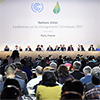Background on the UNFCCC: The international response to climate change

In 1992, countries joined an international treaty, the United Nations Framework Convention on Climate Change, as a framework for international cooperation to combat climate change by limiting average global temperature increases and the resulting climate change, and coping with impacts that were, by then, inevitable. By 1995, countries launched negotiations to strengthen the global response to climate change, and, two years later, adopted the Kyoto Protocol. The Kyoto Protocol legally binds developed country Parties to emission reduction targets. The Protocol’s first commitment period started in 2008 and ended in 2012. The second commitment period began on 1 January 2013 and will end in 2020. There are now 197 Parties to the Convention and 192 Parties to the Kyoto Protocol.
To reach these ambitious goals, appropriate financial flows, including by, before 2025, setting a new goal on the provision of finance from the USD 100 billion floor, and an enhanced capacity building framework, including an Initiative for Capacity Building, will be put in place: thus supporting action by developing countries and the most vulnerable countries, in line with their own national objectives. The Agreement will also enhance transparency of action and support through a more robust transparency framework. The UNFCCC secretariat supports all institutions involved in the international climate change negotiations, particularly the Conference of the Parties (COP), the Conference of the Parties serving as the meeting of the Parties (CMP), the subsidiary bodies (which advise the COP/CMP), and the COP/CMP Bureau (which deals mainly with procedural and organizational issues arising from the COP/CMP and also has technical functions). For a brief depiction of how these various bodies are related to one another, please see Bodies. |


No comments:
Post a Comment